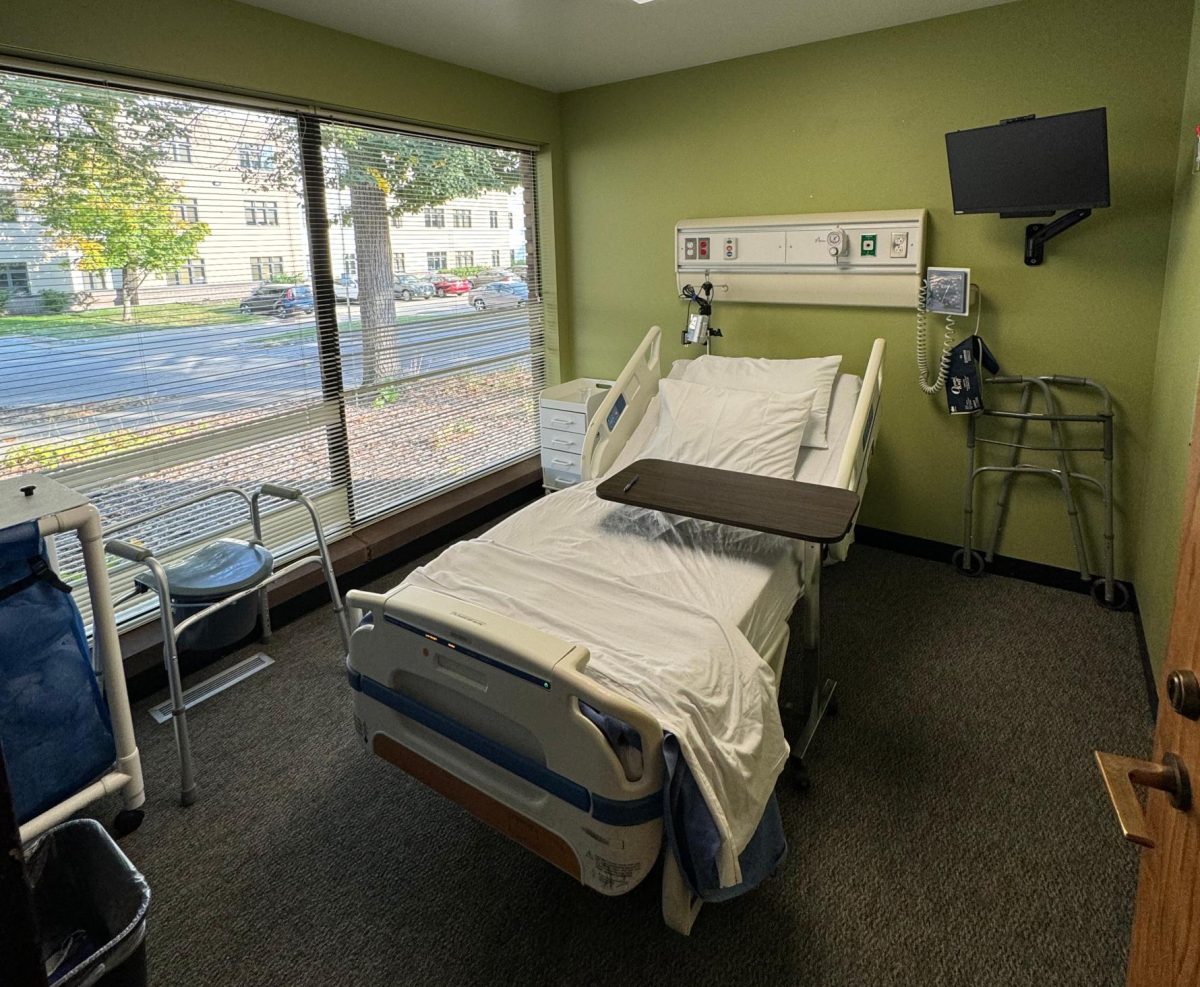“It depends.”
It’s a phrase the first cohort of the Accelerated Bachelor of Science in Nursing program hears a lot, said Mary Owens, associate professor and director of nursing.
“Caring for clients and patients is as individualized as the person,” Owens said in an email to The Times-Delphic. “Every single time a student walks into a client/patient room, they need to assess and consider many variables before performing an intervention or making a decision.”
Teaching students this process of “thinking like a nurse” is the focus of the ABSN program, Owens said. Having the American Republic Student Health Center, which is located at Carpenter Avenue and 32nd Street, as the program’s hub could help students master it.
“It’s very much a hands-on learning environment,” Owens said. “It’s really helping them think like a nurse.”
Three aspects of the center are driving this learning.
First, the rooms replicate different clinical settings. There are six different rooms that replicate acute care and home care environments. For example, one room is staged for pediatrics and another is staged as a bedroom. Students have access to a medication room where they can practice starting IVs, drawing blood and administering a variety of medications. There are also several supply closets.
Beth Posey, a current student of the ABSN program, said the variety of rooms makes the American Republic Student Health Center work well as a nursing classroom.
“I think it works really well, especially [when] we’re going into patients’ rooms that are actually designed to be patients’ rooms and being able to practice some of those [nursing procedures],” Posey said.
Second, the size of the rooms forces students to adapt like a nurse, Posey said.
“[The rooms] can be tight, especially when there’s three or four of us and we’re trying to do something,” Posey said. “But that’s real life. Patients’ rooms…can be cramped, especially if it’s [filled with] the patient, a nurse, a doctor and the family. You just gotta learn how to deal with that.”
Third, mannequins are situated throughout the center. Some can breathe, cry and scream.
“It’s really nice to be able to practice on something,” Posey said. “If I can find a pulse on this mannequin, I can find a pulse on a person.”
At first, Posey said she was skeptical about the nursing program being facilitated in the American Republic Student Health Center.
“When I first heard we were gonna be over there, I was a little unsure just because it was the old student health center, so I was like, ‘I don’t know if it can be a classroom,’” Posey said.
Built in 1971, the building housed Drake’s student health and counseling services for more than 50 years, Venessa Macro, the chief administration officer at Drake, said in an email to the TD. In May 2022, construction on the Broadlawns Clinic on University Avenue began. The American Republic Student Health Center closed. It would remain vacant for over two years.
The original plan was to hold the ABSN program in Harvey-Ingham Hall.
Then, on April 19, 2024, Oak Park University, a nursing school in Chicago, closed, according to Chicago’s Very Own WGN-9 TV. Drake purchased medical teaching equipment and furniture from the school for a low price, Macro said in an email.
“We were able to…obtain a lot more inventory than we would have otherwise been able to,” Macro said in an email to the TD. “This meant, however, that we needed a larger space to effectively use the equipment and technology.”
Over the summer, the Drake Facilities Planning and Design team and the College of Pharmacy and Health Sciences administration weighed the option of housing the nursing program in the American Republic Student Health Center. They deemed it desirable in July, Macro said in an email.
Although unsure at first, Posey now says the center “works well” as a nursing school.
“I think that it’s pretty unique, and if we were in a regular classroom, I don’t know if we would really get out as much,” Posey said.
The ABSN program is one of the newest additions to Drake’s academic catalog. It launched at the start of the fall semester. The program covers 51 credits worth of material in 12 months.
“It’s very compact and it’s very intense,” Owens said.
The first cohort of the ABSN program will be honored at Drake’s graduation ceremony in May 2025. They’ll have obtained two degrees by August 2025: a bachelor’s in nursing and a bachelor’s in health sciences. After that, they’ll take the NCLEX exam.
“My goal is [creating] great nurses [who] not only pass boards, but are impactful in our community,” Owens said. “I want to train nurses to be leaders in their profession, so we continue to build our respect and trust that we have.”







